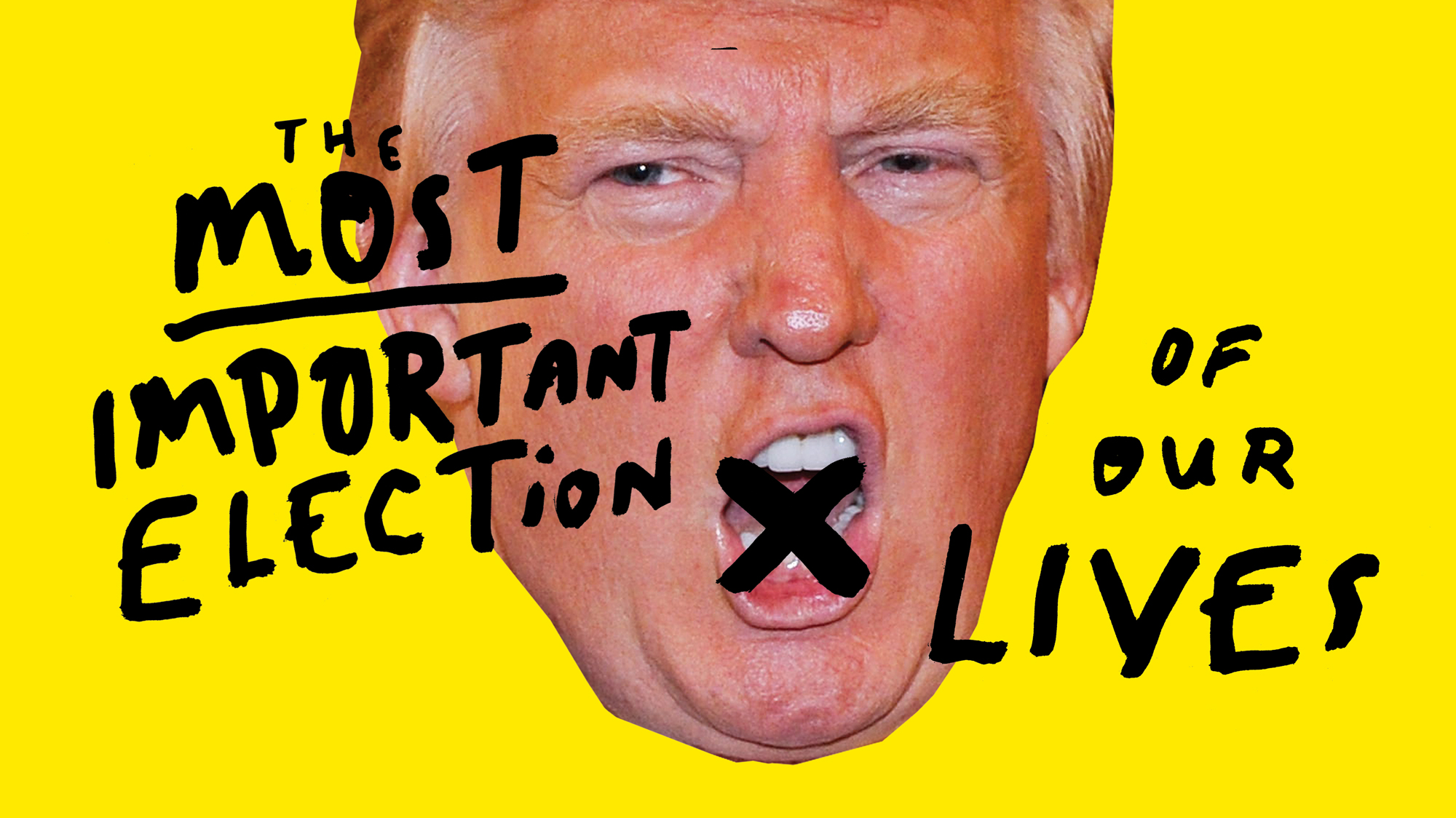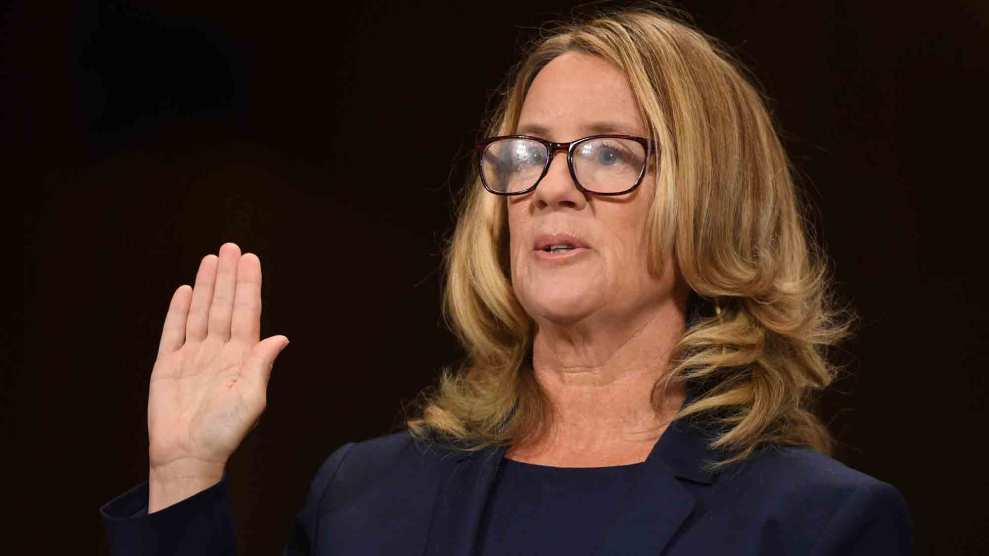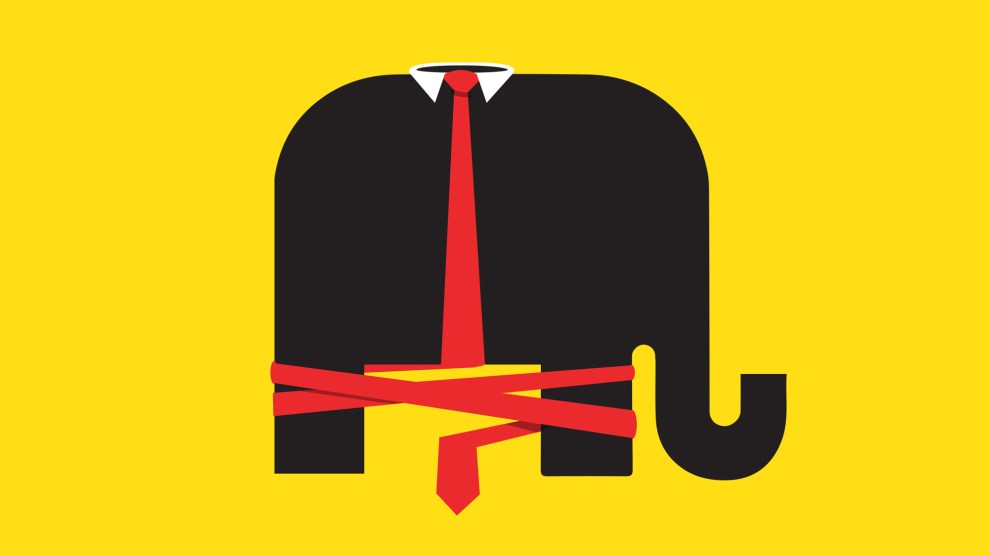You hear it almost every time: This is the most important election of our lives. And there’s usually an element of truth. Ronald Reagan defeating Jimmy Carter led to an orgy of tax cuts for the wealthy and a blitz of deregulation that altered the US government and American society. The 1994 election brought Newt Gingrich to power as House speaker and a so-called Republican Revolution that ensured a national health insurance program sought by Bill Clinton would stay dead. George W. Bush’s Supreme Court-imposed victory over Al Gore placed in office a man who would launch the disastrous Iraq War that claimed the lives of more than 4,400 American soldiers and hundreds of thousands of Iraqi civilians.
Elections are always crucial. But this year, it really, really is the most important contest in decades. Or at least since 2016.
The most recent election ushered in not only a president who has pushed an extreme policy agenda—handing out huge tax breaks to the well-to-do, reversing climate change action, engaging in trade wars, assaulting the social safety net, nominating die-hard conservative judges, and undermining health care protections—but one who adopted an erratic and destabilizing approach to, well, everything. It created a political crisis, because Donald Trump has waged a war on norms of governance, the rule of law, productive discourse, and the media, as he has set a record for uttering false statements, overseen a regime riddled with corruption, given comfort to racists, misogynists, and wacko conspiracy theorists, and displayed a disturbing affinity for autocracy.
As Trump daily launches crass and bullying tweets that disseminate disinformation, and as he seeks to forcibly reframe the political culture of the nation, the 2018 midterm elections boil down to one overarching question: Will he and his GOP lackeys—who have enabled his assault on decency, his fact-free and haphazard method of policymaking, and his narcissism-driven leadership—be rewarded for their actions? And to be more specific: Will the candidate who captured the White House in part because he aided and abetted the Russian attack on the 2016 election (by falsely claiming this assault was not real) continue to get away with this act of betrayal?
Trump has trampled the Constitution, openly defying the emoluments clause and directing an administration rife with conflicts of interest and ethics violations. He has used his office to personally profit and has made the White House a beacon of nepotism. He has empowered the swamp. He has debased American politics—yes, it was possible—by relying on insult over argument. He has trashed the rule of law, denigrating federal law enforcement efforts and undercutting prosecutions and investigations, if not outright obstructing them. He has urged his attorney general to abuse the powers of government to launch unfounded criminal investigations against his political enemies and to smother criminal investigations of Republican congressmen. Trump has embraced classic elements of authoritarianism, most notably relentlessly and dangerously assailing the media as “the enemy of the people” and purveyors of “fake news.” He has hailed autocrats around the globe, including Kim Jong Un, Rodrigo Duterte, Recep Tayyip Erdogan, and Vladimir Putin. (Trump said he wanted Americans to “sit up at attention” for him just as North Koreans do for the tyrannical Kim, who once had a defense minister killed by anti-aircraft guns for insubordination and falling asleep at a rally.)By now, anyone who has bothered to consider the coming midterm elections for a nanosecond realizes this campaign will determine whether congressional Democrats can win control of either the House (more likely) or the Senate (less likely) and obtain the power to thwart Trump’s policy moves. With one chamber in their hands, they can block his efforts to hurl more tax breaks at the rich and prevent additional steps to destroy what’s left of Obamacare. They can try to protect special counsel Robert Mueller’s investigation. That’s a big deal. But there’s a deeper and more profound matter at stake: accountability.
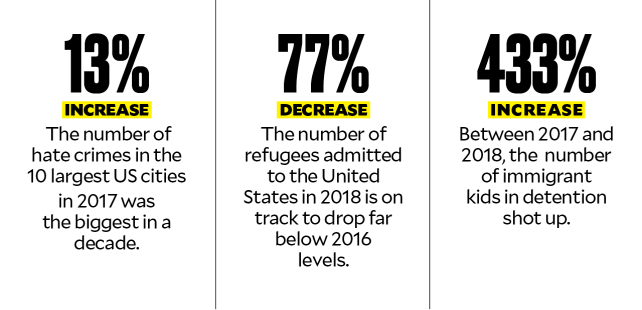
Trump has also been inept and negligent in managing the federal government, failing to fill many crucial positions and showing scant interest in the nuts and bolts of policymaking. At a key meeting with House Republicans about a health care bill in 2017, Trump declared he had no interest in the details. “Forget about the little shit,” he said. On his watch, the federal government tragically failed Americans in Puerto Rico, as Hurricane Maria devastated the island, causing an estimated 2,975 deaths. His administration launched the zero-tolerance immigration crackdown without preparing for the consequences, and that yielded the horrific family separation crisis. Trump has obsessively golfed at his own properties (read: self-enrichment), yet as of mid-September he had not once visited US forces in a war zone. He has cavalierly threatened nuclear war.

Mirian Medina stands on her property about two weeks after Hurricane Maria swept through San Isidro, Puerto Rico.
Mario Tama/Getty
And then there is Russia. It is now evident that members of the Trump crew at the very least attempted to collude with what they were told was a secret Kremlin plot to skew the 2016 campaign in Trump’s favor. Trump and his lieutenants also assisted Putin’s attack on American democracy by embracing and promoting Moscow’s claim that it was not intervening in the election. Trump even did this after US intelligence officials briefed him in midsummer 2016 that Russia was waging cyber and information warfare against the United States. As a candidate, Trump signaled to Russia that he did not mind its hacking; he even encouraged it. And as president, he dismissed or downplayed Putin’s attacks. He has lashed out at the investigations of Russia’s intervention and promoted crackpot theories (Obama wiretapped me!) to distract and divert attention, and he has not made it a federal government priority to prevent similar operations in the future. Quite simply, this is a violation of his oath to defend the United States. He is a president guilty of outright negligence.
None of this is normal—or healthy for the body politic. And none of it is ideological. Rampant and brazen lying—the Washington Post identified 5,001 false or misleading claims made by Trump in his first 600 days as president—is not a partisan matter. Nor is bullying. Nor is governing by spite. (See John McCain, the NFL players, and “Pocahontas.”) Nor is boosting conspiracy theorists. Nor is bear-hugging murderous autocrats while rudely dissing allies. (At a G-7 meeting, Trump allegedly tossed Starburst candies toward German Chancellor Angela Merkel and said, “Here, Angela. Don’t say I never give you anything.”) Nor is buddying up to Putin and failing to protect the nation.
Oh, it’s a long list. Calling nations “shithole countries.” Labeling a female critic a “dog.” Maligning black foes as “low IQ.” Opening up the Oval Office to such deplorables as a QAnon conspiracy champion and Ted Nugent (who once called on Barack Obama to “suck” his machine gun). Asserting that “very fine people” attended a white supremacist march. Blaming the Parkland shooting on the Russia investigation. Politicizing presidential pardons. Denouncing federal prosecutors, attacking courts and judges, and urging a convicted tax cheat not to cooperate with the government. Deriding Democrats as “un-American” and “treasonous” for not applauding his State of the Union speech. Lying about hush money payments and allegedly mounting a criminal conspiracy to violate campaign finance laws. These are not policy matters. This is the conduct of a leader who daily threatens constitutional governance and healthy debate within a country that’s already deeply divided. And Republicans in Congress have not checked Trump on any of this. They have enabled and covered for him as he has degraded American government and politics.
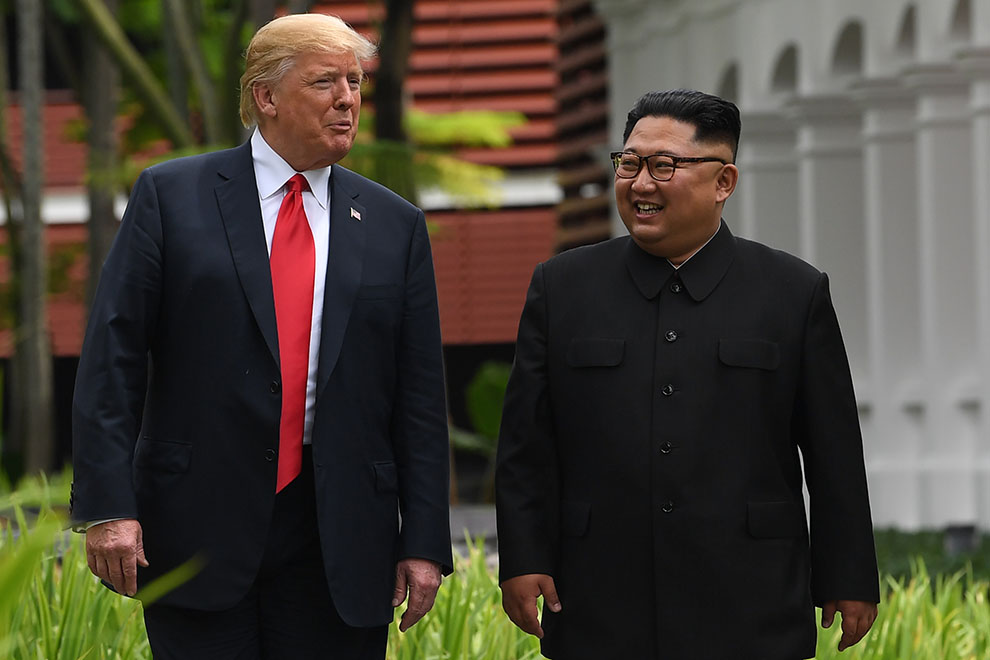
North Korea’s leader Kim Jong Un walks with President Donald Trump during a break in talks at their historic US-North Korea summit, at the Capella Hotel on Sentosa island in Singapore.
Saul Loeb/AFP/Getty
In doing so, the GOPers have conveyed a troubling message: This is all okay. It’s fine to cuddle up with a foreign brute who attacked the United States. It’s not a problem to vandalize the rule of law, undermine democratic institutions, and put a bull’s-eye on the backs of journalists. It’s all right to play footsie with white supremacists. Nothing to see here. Move along. Recall that when Trump first raised the possibility of revoking the security clearance of former CIA chief John Brennan in retaliation for Brennan’s criticisms of him, House Speaker Paul Ryan dismissed it as mere trolling. When Trump proceeded with the revocation—an unprecedented act of revenge that set the stage for further clearance withdrawals, which could harm the intelligence community—Ryan shrugged. (How do you shrug without a spine?)
Mother Jones’ journalism tells it like it is. Support it with a tax-deductible donation today.
So the coming election will demonstrate whether Trump and the GOP can escape retribution for all this. Will he and his Republican helpmates be validated and bolstered after the twisted run of the past two years? Does governing in this manner have consequences? If there is no price to pay, won’t Trump’s GOP-assisted assault on democracy and his corruption of the nation’s political culture continue?
Power without accountability is a profound danger, especially when a shame-free chief executive who obsessively focuses on his own interests and petty grievances is driving the bus through an expanding swamp. Two years after the election, Trump and his crew have produced a slew of actions and a mess of sleaze that require thorough examination and investigation—and that Republicans in charge of Congress have largely ignored, sidestepped, or buried.
In August, Axios obtained a spreadsheet disseminated within anxious Republican circles in Washington that listed the possible probes Democrats could launch if they become the majority in the House. The roster was long and included investigations into Trump’s taxes, Trump’s family business deals, Trump’s payments to Stormy Daniels, the firing of FBI Director James Comey, White House staffers’ security clearances and use of personal email, Trump’s discussion of classified information at his Mar-a-Lago estate, Jared Kushner’s conflicts of interest, the family separation policy, the administration’s response to Hurricane Maria, and so much more. And this list is hardly comprehensive. Several Cabinet members—perhaps most of them—and senior staffers would be legitimate targets of Democratic congressional gumshoes: Steven Mnuchin, Wilbur Ross, Betsy DeVos, Ben Carson, John Bolton, Ryan Zinke. Certainly House Democrats, if they gain control, would consider relaunching the Russia investigation, which House Republicans shuttered after mounting a laughable effort that seemed designed to protect Trump. As Axios noted, demands from subpoena-wielding Democrats “would turn the Trump White House into a 24/7 legal defense operation.” This could do more to weaken and constrain Trump, as he heads toward the 2020 race, than impeachment proceedings in a Democratic-run House.
Midterm elections are an amalgamation of local elections, with most shaped by the issues and personalities of the particular contest. This year, many Democratic candidates in crucial races are emphasizing health care and wages—what they can do for voters—rather than Trump’s creeping authoritarianism and terrible record as a human being. One House Democrat tells me that party strategists have counseled Democratic contenders not to dwell on the Russia scandal, maintaining it’s not a top-of-the-list matter for in-the-middle voters.
Yet kitchen table issues cannot be fully addressed if the house burns down. Trump is a threat to rational deliberation, to good government, and to the fundamental principles that are supposed to guide the American system. He is not on the ballot this fall. But as he himself has said, the election is “very much a referendum” on him. Should the Republicans hang on to the House and Senate, the lesson will be obvious: A hate-filled and low-information president can preside over a regime of corruption and self-interest, fail to secure the nation, assail democratic norms and decency, and…suffer no penalty. Trump would be unleashed and even more emboldened to adhere to his dark instincts. (Watch out, Jeff Sessions.) This validation of Trump in some ways would be more consequential than the election of Trump—and set up the 2020 contest as the next most important election of our lifetime.
